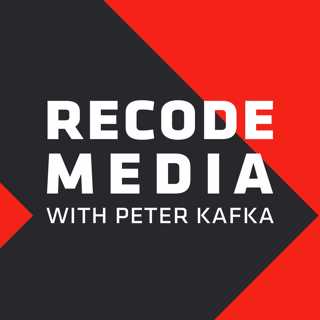
What people get wrong about Robin Williams’ life — and his death
New York Times reporter Dave Itzkoff talks with Recode's Peter Kafka about his new book, "Robin: The Definitive Biography of Robin Williams." Itzkoff traces the history of the manic comedian and actor, whose stardom spanned more than four decades in roles in TV shows, such as "Mork and Mindy," and movies, like "Good Will Hunting." After Williams' death by suicide in 2014, Itzkoff says fans and the media were led astray by incorrect or incomplete explanations for what happened, and that Williams' reasons for taking his own life were more complicated than many assumed. Itzkoff also talks about whether another movie star like Williams could emerge in today's Hollywood, his interactions with the comedian as a journalist and how much time he spends crafting jokes for his popular Twitter account @ditzkoff. Learn more about your ad choices. Visit podcastchoices.com/adchoices
17 Maj 201848min

The Outline CEO Josh Topolsky: Online ads are stuck in the '90s
Josh Topolsky, CEO and editor in chief of The Outline, talks with Recode's Peter Kafka about the importance of good internet-native design for both advertising and editorial content. Topolsky dismisses the idea that everything publishers put out will move behind paywalls, arguing instead that when ads are done well, they can engage readers and support free content. Most of the time, though, online media companies have forced boring ads on their audiences, who have learned to ignore them. He also talks about his past life as a music producer, picking a fight with Mike Bloomberg and what it's like to raise money when you have a reputation as someone who can be difficult to work with. Learn more about your ad choices. Visit podcastchoices.com/adchoices
10 Maj 20181h

'Chasing Hillary' author Amy Chozick looks back on a decade of writing about Hillary Clinton
New York Times writer-at-large Amy Chozick talks with Recode’s Ed Lee about her new memoir, “Chasing Hillary: Ten Years, Two Presidential Campaigns, and One Intact Glass Ceiling.” Chozick says the book is about more than Hillary Clinton’s unsuccessful campaigns for president; it’s also about all the things reporters didn’t write in their stories about Hillary Clinton, and the “decline of campaign reporting.” In 2016, she explains, dramatic technological changes made Donald Trump’s victory possible and made it harder for political reporters like her to justify always being “on the bus” with Clinton. She also talks about the Clinton family’s contentious history with the New York Times, and how attending the annual media/finance conference Sun Valley led to one of the most humiliating experiences of her reporting career. Learn more about your ad choices. Visit podcastchoices.com/adchoices
3 Maj 201846min

This is how the New York Times reports Pulitzer Prize-winning stories
New York Times reporter Emily Steel talks with Recode's Peter Kafka about the stories she and her reporting partner Michael Schmidt wrote that brought down Fox News star Bill O'Reilly — part of a series of stories on sexual harassment that netted the Times and the New Yorker a Pulitzer Prize for public service. Steel says she and Schmidt strategized before every phone call and recalls how she got her first source to talk on the record, an act of dogged reporting that necessitated a cross-country flight to take a Pilates class. She also discusses her subsequent story about the toxic culture at Vice Media, a contentious interview with O'Reilly that was broadcast on the NYT's hit podcast The Daily and why she doesn't use Twitter as much as colleagues do. Learn more about your ad choices. Visit podcastchoices.com/adchoices
26 Apr 201855min

Our hoax-filled internet, now available as a book (Rex Sorgatz, author, 'The Encyclopedia of Misinformation')
Writer Rex Sorgatz talks with Recode’s Peter Kafka about his new book, “The Encyclopedia of Misinformation: A Compendium of Imitations, Spoofs, Delusions, Simulations, Counterfeits, Impostors, Illusions, Confabulations, Skullduggery, Frauds, Pseudoscience, Propaganda, Hoaxes, Flimflam, Pranks, Hornswoggle, Conspiracies & Miscellaneous Fakery.” Sorgatz says he doesn’t want readers to move through the book in order; instead, they should open it to a random page, read an article and then see where the footnotes at the bottom of the page tell them to go next. He also talks about the T-word: How much should a book about falsehoods, released in 2018, acknowledge the mendacity of President Donald Trump? Learn more about your ad choices. Visit podcastchoices.com/adchoices
19 Apr 201841min

Outside Magazine editor Axie Navas: Yep, we're getting more political.
Axie Navas, the executive editor of Outside Magazine, talks with Lauren Goode about how that magazine is adapting to the changing digital media industry. One of her key initiatives has been diversifying the editorial staff of the Santa Fe-based magazine and covering issues like sexual harassment, even though its readers are still largely male. Navas explains how Outside is trying to reach new audiences, including younger readers and city dwellers. Plus: Why it has consciously gotten more political since Donald Trump became president, providing a platform for articles like a critical profile of Secretary of the Interior Ryan Zinke and, after an inflammatory Trump comment about immigration last year, "Top 5 'Shitholes' To Visit." Learn more about your ad choices. Visit podcastchoices.com/adchoices
15 Apr 201845min

How Marques 'MKBHD' Brownlee got six million subscribers on YouTube
Tech reviewer Marques Brownlee talks with Recode's Peter Kafka about his YouTube channel, MKBHD, which has more than six million subscribers — a breakthrough success story on the site. Brownlee started making videos for fun in 2009, when he was 15, but today he's doing well enough to have three full-time employees working under him. He explains how he works with the tech companies who want to get their products in his videos and how he's still able to maintain a certain level of anonymity in public. Plus: Brownlee shares his advice for anyone who wants to make YouTube videos and be the next MKBHD. Learn more about your ad choices. Visit podcastchoices.com/adchoices
12 Apr 201841min

Financial Times CEO John Ridding: How to make people pay for media
Financial Times CEO John Ridding talks with Recode’s Peter Kafka about the company’s decade-long head start in paid online subscriptions. Some of his peers in the tech and media world were initially “hostile” to the idea of a paywall, he says, but two-thirds of the FT’s current revenue is coming from subscriptions. Ridding also talks about how the London-headquartered newspaper has butted heads with some of the big tech platforms, how its global business-minded staff has grappled with the Brexit and Trump phenomena, and how the business has changed since Nikkei bought the FT in 2015. Learn more about your ad choices. Visit podcastchoices.com/adchoices
5 Apr 201839min






















